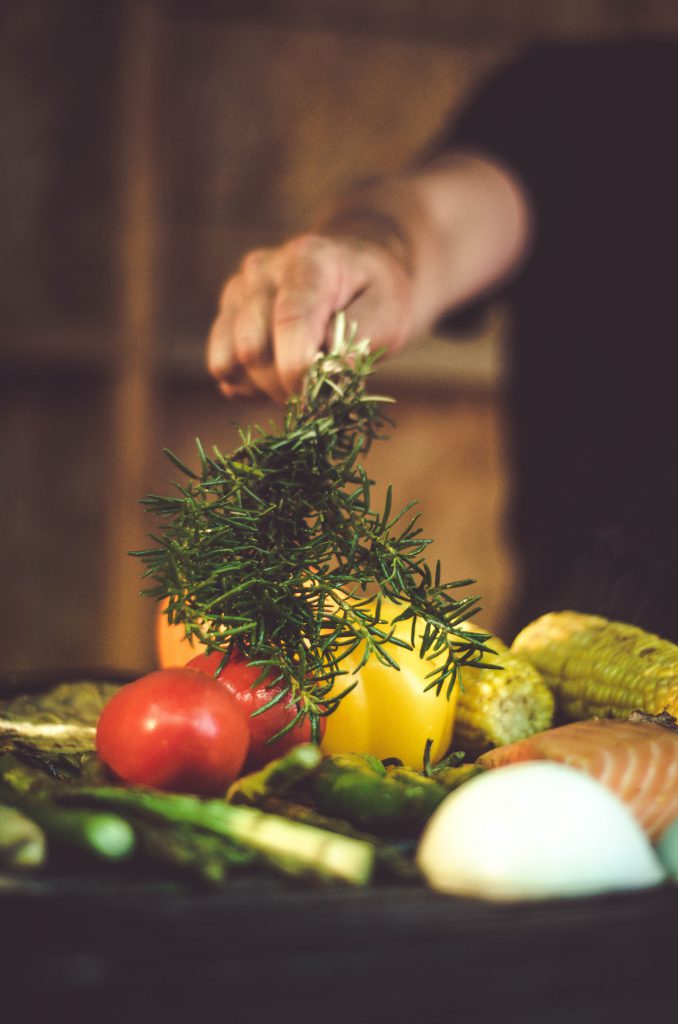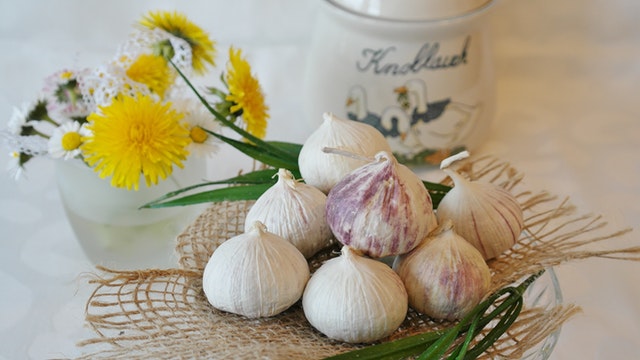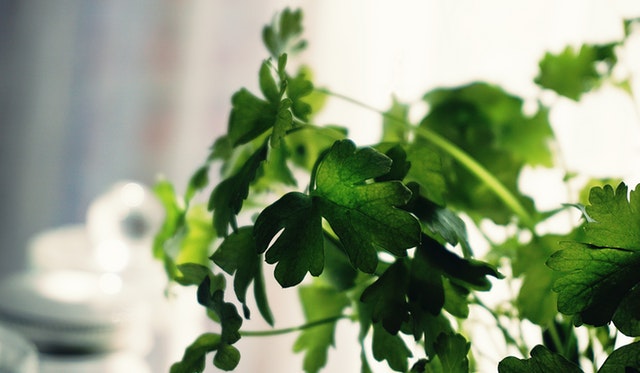Cooking with herbs: Health Benefits
We’ve all been there. You’re in the kitchen, grabbing food, and hurriedly throwing it in the pot while a hungry group of friends stares at your back.
But how often do you sacrifice healthy meals for quick ones??
More people are realizing how closely diet affects their overall health nowadays. Considering the amount of people struggling with weight loss, irritable bowel syndrome, or even simply an upset stomach, it is easy to see why. Research shows that food can not only fill our stomachs but can also heal our bodies. As Hippocrates says: “Let food be thy medicine.”
And the best medicine comes from our gardens.
Rosemary, For Nose and Allergies
Ah, Rosmarinus officinalis, our lovely perennial herb that makes chicken (or tofu) so, so tasty. Rosemary gives a savory, earthy flavor to your meals. Some call it “woody” or compare it to mustard. But what exactly do these needle-like leaves do for our body?
This attractive plant contains phytochemicals such as rosmarinic acid and camphor. Camphor was used in ancient India as a medicine for fever; its benefits are the ability to reduce fever and aid with swelling. The small amounts in rosemary can also help with congestion.

The rosmarinic acid, of course, is the main player here. It’s anti-everything bad for you: antioxidant, anti-inflammatory, antiviral, and antibacterial.
Next time you’re sick consider adding rosemary to your chicken noodle soup, or add a dash to any meal for additional health benefits with a delicious flavor!
Thyme, For Protection
When it comes to standard kitchen fare, thyme is a reliable standby in the herbs and spices rack. This herb imparts a subtle aroma, likened to mint. Not only does it play well with others, but it also doubles the antibacterial properties of whatever you’re cooking.
The active ingredient here is thymol. This fierce antiseptic was used to soak bandages in ancient times to guard us against infection. Now how do we use it? In mouthwashes. That’s right. Thyme is in that bottle of Listerine.
If it’s helping keep your mouth clean, what lovely things is it doing for us farther inside?
Garlic, For Heart Health
A close cousin to the onion, garlic has been used for thousands of years as a food and medicine. This garden gem will set off your spice sensors with its warm taste. Usually, you’re going to want to roast it to mellow it out. Other than its warrior nature against things like the common cold (Seriously folks, rosemary, garlic, hot water. It knocks it right out of me.), the plant can also be used to help your heart.
The powerhouse is allicin which is activated by crushing or chopping garlic and letting the air reach it. Allicin reduces cholesterol levels in the blood and regulates blood pressure. Research suggests an effect on muscle soreness, and the heart is the hardest working muscle in the body. Is that a reach? Of course, but it’s nice to think about.

Basically, you’re doing yourself a favor by ordering that garlic bread. Tell them I sent ya.
Turmeric, for Inflammation
This herb grows wild in South and Southeast Asian forests, and it gives curry its bright orange color. The herb is aromatic and more on the bitter side. Some compare it to ginger with a dab of orange. It’s found easily in stores in a ground powder form. This was something easy for me to grab during a grocery run and slap into a dish at home.
Born in Ayurvedic medicine, the herb adds a beautiful flavor to most savory dishes as well as its anti-inflammatory properties. This comes from a phytochemical inside called curcumin, and also where the vibrant color comes from.
Looking at our traditional Western diet, we could all use a little turmeric at our side to fight inflammation. Sugar is great but wow does it swell us up.
Lemon Balm, for Sleep & Digestion
This herb is one you’ve probably seen as an essential oil, but you can also use it in food. “Balm,” or “Mint Balm,” not to be confused with “Bee Balm,” is from the mint family. This may be used more in sweet dishes and teas, but anything (like fish) that could use some uplifting lemon notes to its flavor profile would benefit.
Lemon balm also contains rosmarinic acid, but with its other eugenols, tannins, and terpenes, the plants overall chemical effects are changed. Instead of just anti-everything-bad-for-you, it’s a soothing effect that helps you sleep. Lemon balm is still the main ingredient in Carmelite water which is still for sale in German pharmacies to this day.
A close friend suggested a simple recipe of cooking heirloom tomatoes with lemon balm and goat cheese. It’s a light, refreshing dish you can serve by itself, or with some toasted bread, similar to bruschetta.
Coriander(Cilantro), for Vitamins
While I’m one of the small percentages of people that taste soap when I eat this herb, I still try to include it in my diet. It’s also included here simply because it’s healthier than people realize. Similar to the earlier lemon balm, this plant has a lemony flavor, but it also has notes of orange, nuts, and a general spice aroma.
Native to Iran, coriander grows wild all over Western Asia and Southern Europe. Studies have shown that the plant’s leaves contain major amounts of vitamin A, C, and K, plus a large helping of beneficial dietary minerals. If you want, you can also use the seeds in your cooking. While they have less of those vitamins, they do make up for it in fiber, calcium, iron, and magnesium.

Basically, you’ve got a great arsenal of supplements all ready for you either growing in your garden or easily picked up at the store. Try a new recipe, and you may find something delicious and nutritious. Your body will thank you.

